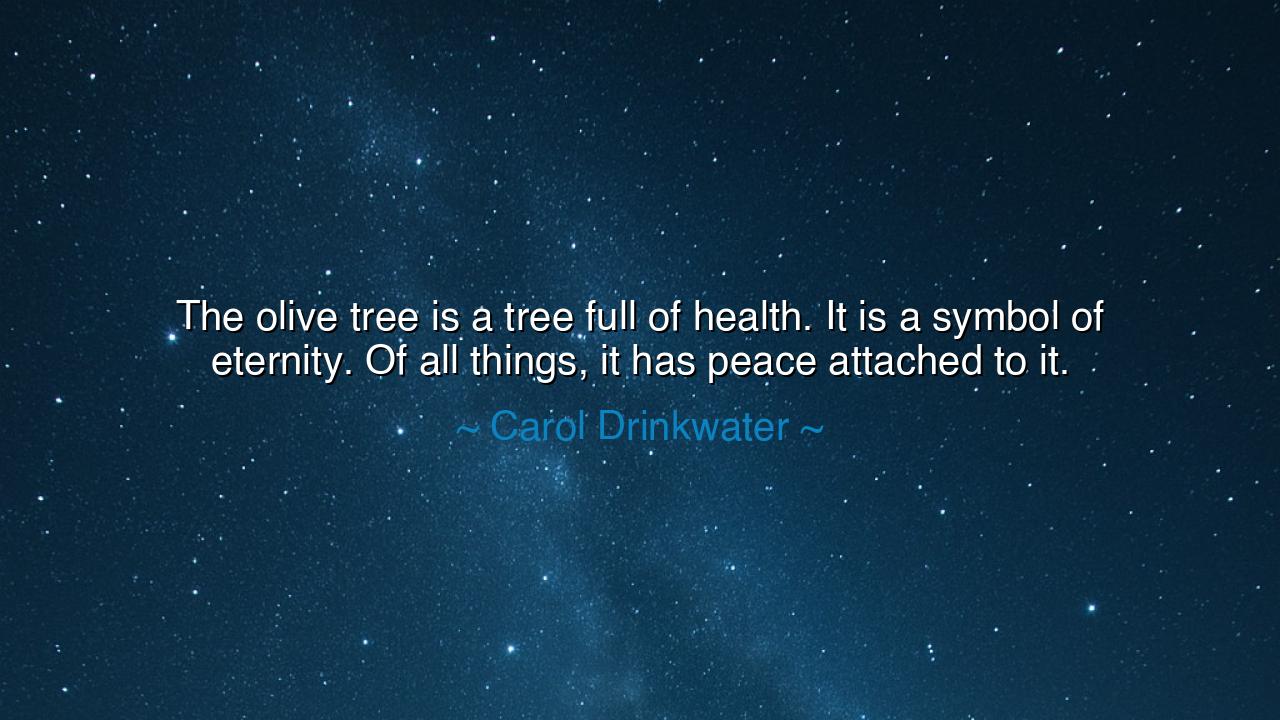
The olive tree is a tree full of health. It is a symbol of
The olive tree is a tree full of health. It is a symbol of eternity. Of all things, it has peace attached to it.






The poet and storyteller Carol Drinkwater, whose hands have tended the ancient groves of Provence, once said: “The olive tree is a tree full of health. It is a symbol of eternity. Of all things, it has peace attached to it.” In these words lies the voice of both earth and spirit, speaking of one of humanity’s oldest companions—the olive tree, whose silver leaves have whispered across the millennia. Drinkwater, known for her devotion to the land and her chronicles of the olive’s history, speaks not only of a plant but of a living symbol—a bridge between the mortal and the divine, between nourishment and wisdom, between the struggle of life and the serenity of endurance.
The olive tree, born in the cradle of civilization, has always been a symbol of health, both physical and spiritual. Its oil has fed the body, healed the wound, and anointed the sacred. The ancients called it liquid gold; Hippocrates, the father of medicine, named it a cure for “a hundred ailments.” Its roots dig deep into the stony soil, finding sustenance where none seems to exist. From it we learn that health is not the absence of struggle, but the harmony that grows through endurance. To drink of the olive’s fruit is to partake in the vitality of the earth, to absorb the patience of centuries.
When Drinkwater calls it a symbol of eternity, she speaks to its immortal strength. For the olive tree does not die easily; it bends but does not break. When burned by fire or cut to the ground, it rises again from its roots, reborn with new shoots that reach for the sun. In this resilience lies the secret of eternity—not in escaping death, but in rising again from it. Thus, kings and prophets alike saw in the olive a reflection of the soul’s immortality. In the Scriptures, after the flood, it was an olive branch that the dove carried back to Noah—a sign that life had returned to the earth, that even after destruction, peace and renewal were possible.
The olive tree has also been a herald of peace, its branches woven into the crowns of victors and offered between enemies to signify truce. The ancients of Greece crowned their Olympians with olive wreaths, not for conquest but for excellence—an achievement of the body in harmony with the spirit. In times of war, an olive branch carried by hand was a sign that hatred could end, that hearts could return to stillness. So when Drinkwater says “of all things, it has peace attached to it,” she recalls this ancient wisdom: that the tree’s strength lies not in aggression but in endurance, not in speed but in stillness.
History offers a living testament to this truth. During the long wars of the Mediterranean, olive groves were often destroyed to break a people’s spirit. Yet time and again, those same trees grew back, stubborn and serene. After the devastation of World War II, farmers in Greece and Italy returned to their burned lands and found new shoots sprouting from blackened trunks. The people wept and planted anew. The olive, in its quiet defiance, taught them the lesson of peace through persistence, of beauty reborn from ashes.
The lesson, then, is as eternal as the olive itself: cultivate in your own life the virtues of the tree. Be strong in adversity, patient in growth, generous in your gifts. Seek health not only for the body, but for the spirit that sustains it. Let your actions be like the olive branch—symbols of reconciliation, offered even to those who oppose you. When the storms of life come, do not curse them; endure them, for your roots are deeper than you know. True peace, like the olive tree, grows not from ease, but from steadfastness.
So, children of the earth, remember the wisdom of Carol Drinkwater. Plant an olive tree, or tend to one in your heart. Let it remind you that life, though fragile, is also eternal when lived with balance and compassion. Be as the olive: rooted in the soil, yet reaching toward the sky; fruitful in labor, yet serene in silence. And when your own branches bear the fruit of wisdom and kindness, may they bring healing and peace to all who taste of them—just as the olive has done since time began.






AAdministratorAdministrator
Welcome, honored guests. Please leave a comment, we will respond soon